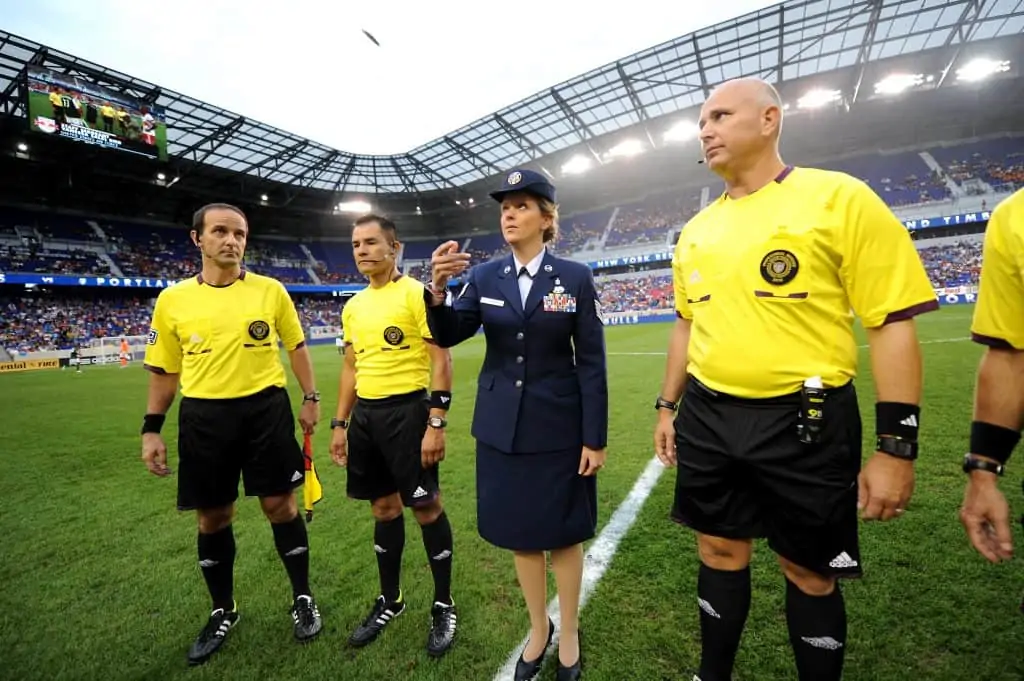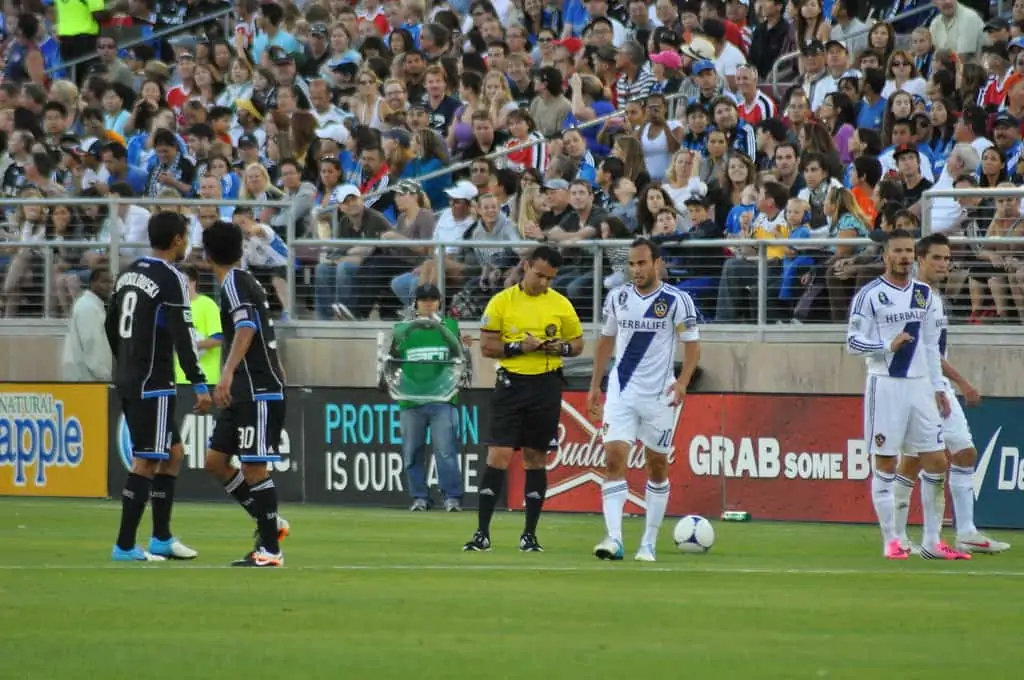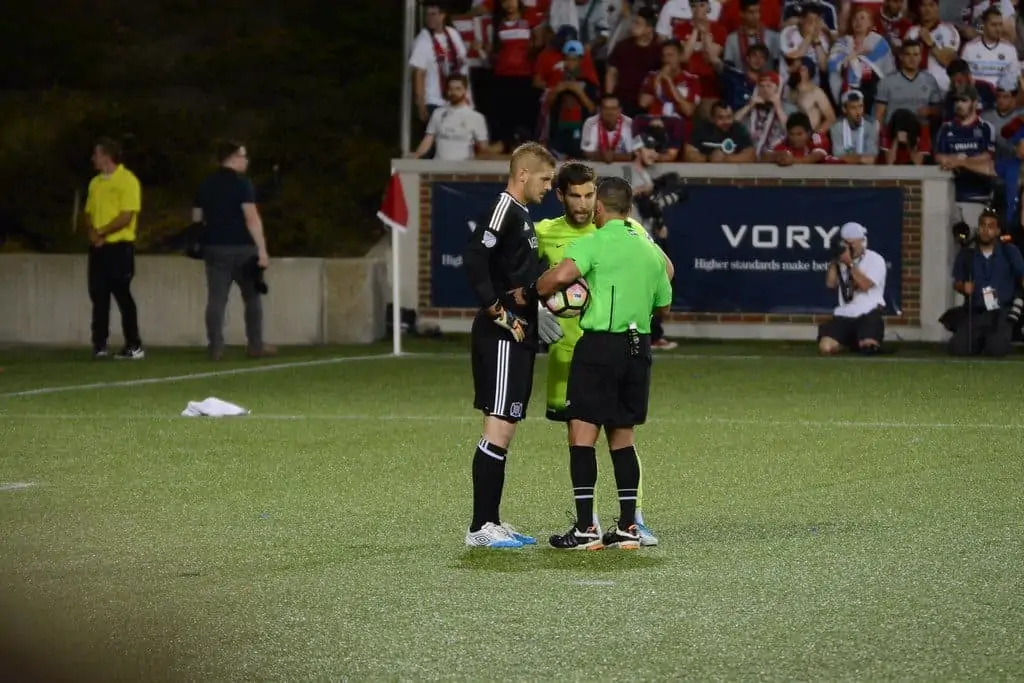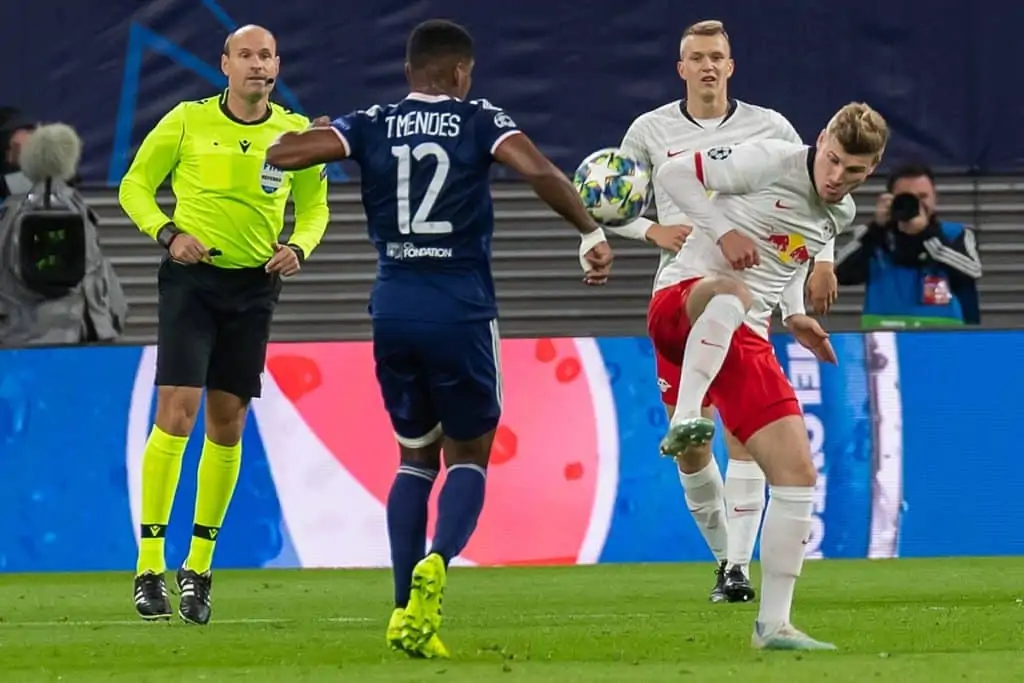Share the post "How To Become a Soccer Referee (All Comps)"
Although a referee’s job might appear simple, it is one of the most challenging roles in soccer, aside from being a player! If you’ve thought about being a referee, we’ve got the necessary steps.
This article takes you through the process of how to become a soccer referee at different levels and covers these essential topics;
- How to become an MLS ref
- How to bcome a Premier League referee
- FIFA referees
- College referees
- High school referees
- How much referees get paid

- How To Become A Soccer Referee
- Becoming An MLS Referee
- Characteristics Of A PRO MLS Referee
- How Do You Become A Premier League Referee?
- How Do You Become A FIFA Referee?
- How Much Does A Euro Referee Make?
- How Do You Become A College Referee?
- How Do You Become A High-School Soccer Referee?
- Do Referees Get Paid Well?
- Are Referees Full-Time?
- Who Is The Best Referee In The World?
- Who is the highest-paid soccer ref?
How To Become A Soccer Referee
To become a soccer referee you must complete the relevant courses, receive the necessary sanctions, and earn the appropriate certifications required by a specific soccer organization.
The specific qualifications can vary depending on the location you want to referee in and the governing body that oversees and regulates competitive games.
For example, in the United States, referees must earn certifications from the US Soccer Federation (USSF) for their specific region. In the UK, referees receive certification from the Football Association (FA). They can apply through their local county FA.
Even referees at a local and regional level must have adequate qualifications. The state US Soccer association conducts background checks on applicants to ensure they are suitable candidates for refereeing youth and adult games.
Referees can progress through the ranks with good performances and experience, eventually reaching the professional level.
In the United States, the US Soccer representatives from a particular state help accelerate local referees’ careers by nominating them to officiate bigger and more important competitions, such as a state cup.

Becoming An MLS Referee
As a US referee, the path to the MLS is relatively straightforward, albeit difficult. Once a regional ref is given the opportunity to work in important state tournaments, they are on US Soccer’s radar.
From here, the best in class are put forward for the regional championship, Development Academy, and high-level amateur games.
Referees at the highest regional level are targeted and scouted by the PRO and PRO2 organizations.
Professional Referee Organization (PRO)
The Professional Referee Organization (PRO) is the group responsible for overseeing and managing the referees and assistant referees for the professional soccer leagues in the US and Canada.
They work closely with the MLS, the USSF, the United Soccer League (USL), and the National Women’s Soccer League (NWSL), among others to implement a suitable officiating system. They also create referee and assistant referee programs for the US and Canada.
The main objective of the PRO is to provide high-level, world-class referees and match officials for professional soccer games in North America.
They also aim is to improve the quality of professional officiating in major competitions by developing referees from a young age, all the way to becoming representatives of the US and Canada in international FIFA tournaments.

PRO2
The PRO2 is a subsector of the PRO, that deals with assigning referees and officials for USL Championship, NWSL, and USL League One (referee feeder league to MLS).
Every season, PRO2 referees have the opportunity to graduate into PRO.
PRO2 represents an important stepping stone into the highest level of professional refereeing in North America.
The PRO Process
Becoming a professional referee through the PRO involves 4 key steps, some of which we’ve already touched on.
Step 1
US Soccer identifies regional referees as potential candidates for transitioning into the professional game.
If local referees have professional aspirations but haven’t been approached, they can contact their local US Soccer branch. Representatives can help accelerate progress through advice or by putting local referees forward to officiate more significant assignments, where PRO2 scouts are more likely to see them.
Step 2
PRO2 scouts observe and evaluate potential candidates. US Soccer scouts typically scout regional referees in state tournaments and important local games, rather than at random district games.
Some of the most important tournaments for budding professional referees are the Generations Adidas Cup, US Youth Soccer Youth Nationals, USASA Amateur Tournaments, and Development Academy showcases.
While these events are prioritized by PRO2 scouts, there is no guarantee that they will be present.
Step 3
If PRO2 scouts determine that officials are performing at a consistently high level, they may be invited into Tier D of the PRO2.
This makes them eligible to officiate professional games in the NWSL and USL. Tier D is the entry-level for scouted refereeing talents.
Tier D referees are observed and evaluated after every game. PRO2 referee coaches provide educational support to help entry-level officials progress.
As entry-level refs gain more experience, they are given the opportunity to gain promotion through the tiers of the PRO2 pyramid.
At each new rung of the ladder, PRO2 referees are afforded more support, including access to sports scientists, tailored development plans, and coaching from PRO2 coaches.
The 4 tiers of the PRO 2 pyramid are:
- Tier D: entry-level referees, scouted by PRO2 staff for their potential to turn professional
- Tier C: first progression stage, providing entry-level refs with more support and resources to further their careers
- Tier B: high-level refereeing talents who show potential to reach the highest level of the PRO2 refereeing system
- Tier A: the top PRO2 prospects that have been identified for potential promotion to the MLS refereeing structure
Step 4
After progressing all the way to Tier A of the PRO2 pyramid, prospective referees can be considered for promotion to the MLS Senior Panel to officiate MLS games.
In some cases, Tier A refs may be given the responsibility of officiating MLS games as a trial. Each trial performance is stringently evaluated.
If the PRO2 coaches and US Soccer representatives believe a referee has what it takes, they are promoted to the PRO, and may be registered as official MLS referees.

Characteristics Of A PRO MLS Referee
Referees are judged on their ability to manage the game, from calling the right fouls to dealing with players and coaches.
Although referees learn their trade through courses and experience, characteristics of a good referee can be summarized by the following 7 Cs:
- Competency
- Confidence
- Communication
- Calmness
- Conviction
- Control
- Consistency
According to the referee widely regarded as the best to ever do it:
“Contrary to what some people say, I think the best referee is not the one who hides. The best referee is the one who always makes a decision when it’s needed.“
Pierluigi Collina 2017
A professional referee should also be physically fit in order to be able to keep up with the demands of a game. On average, a referee runs between 6 and 8 miles in a 90-minute game.
How Do You Become A Premier League Referee?
The journey to becoming a Premier League referee is similar to that of an MLS official. The first step is to complete an FA Referees Course. This must be done through your local County FA.
To be eligible for an FA course, applicants must be 14 years or older. Over time, referees can gain experience and progress through the ranks of the FA to eventually become professional-level Premier League referee.
What Is A Level 7 Referee?
After completing the initial FA Referee Course, participants are considered Level 7, entry-level, junior referees, qualified to officiate amateur league games.
This is the lowest-ranking referee for adults. Although you can complete an official referee course at 14, you are regarded as a Level 8 youth referee until you turn 16.
While referee candidates participate in a course, they are categorized as Level 9 officials. The different levels of an English FA referee are:
- Level 9: Trainee
- Level 8: Youth referee (under the age of 16)
- Level 7: Junior referee (officiates in local amateur leagues)
- Level 6: County referee (officiates county leagues)
- Level 5: Senior county referee (officiates county leagues)
- Level 4: Supply referee (officiates supply leagues)
- Level 3: Contributory referee (officiates National League and Football League as an assistant, or Premier League as a select group assistant)
- Level 2b: Full referee for National League North and South, assistant referee for National and Football Leagues, or select group assistant referee for Premier League
- Level 2a: Panel list full referee for National League, assistant referee for Football League, and select group assistant referee for Premier League
- Level 1: National list full referee for EFL 1 and 2
- Select Group 2: Professional referee for EFL Championship
- Select Group: Professional referee for Premier League
To progress from levels 9 through 4, referees must make annual applications with their local FA. Representatives of the Association assess referees’ performances and check that they meet the relevant criteria before awarding them a promotion.
Criteria for progressing to the next level generally include officiating a certain number of games and receiving at least 3 assessments at their current level.
Referees can progress through 2 levels at once. However, they must complete all criteria at both levels to be eligible. Completing some levels requires referees to participate in training seminars and pass written exams.
When progressing from level 4 to the select group, demands are much higher. Candidates must commit to duties as referees and assistants across a variety of leagues. They must also pass fitness tests, strict assessments, and written exams.
Promotion is based on vacancies and demand on the next rung of the ladder. Premier League and EFL Championship referees are considered professionals.
What Premier League Referees Get Paid
Professional Premier League referees get paid a full-time salary plus additional fees for every game.
The highest level refs, who may also officiate Champions League, Europa League, and international contests can earn up to $268,000 per year from the Premier League, plus an additional $2,000 for every game.
Less experienced referees earn either $64,320 or $93,800 per year, plus the additional $2,000 for every game.
Assistant referees and video assistant referees can make up to $40,200 as a basic yearly salary, plus $1,139 for each game.

How Do You Become A FIFA Referee?
FIFA’s pool of referees consists of the top officials from different professional leagues around the world.
To qualify as a FIFA official, a referee must have the highest possible qualification from a league that’s affiliated with FIFA.
For example, a Premier League referee has the highest possible certifications domestically, meaning they are eligible to officiate international FIFA competitions. PRO certified referees from the US are also qualified to officiate such games.
FIFA chooses all referees for its tournaments.
However, domestic soccer organizations, such as US Soccer or the English FA can nominate their top candidates for FIFA games.
How Much Does A Euro Referee Make?
In European club competitions, like the Champions League, referees can earn up to $10,000 per game. In international European competitions, like the European Championships, experienced refs can make up to $60,000 for the entire tournament.
All major European tournaments are governed by the Union of European Football Associations (UEFA). UEFA is one of the six continental confederations that operates under FIFA, and it consists of 55 national members.
In the recent 2020 European Championships (that actually took place in 2021 due to covid), the officials were paid as follows:
| Ref. Category | $ Per Match | $ For Full Tournament |
| Match Officials (Ref.) | $5,000 | $60,000 |
| Linesperson | $2,500 | $20,000 |
| VAR | $2,500 | $30,000 |
When professional match officials enter the FIFA pool, they are categorized into 1 of 5 different classifications, depending on experience gained in their domestic leagues:
- Elite
- Elite Development
- First Group
- Second Group
- Third Group
- Elite referees have 5 to 7 years of professional experience in their domestic leagues.
While referees from different categories often officiate group stage Champions League and Europa League games, the Elite panel officials are selected for important games, including the round of 16, quarterfinals, semifinals, and finals.
Here is a breakdown of the UEFA Champions League officials’ pay per game for the 2021/22 season:
| Ref. Category | $ Per Game Ref. | $ Per Assistant Ref. | $ Per 4th Official |
| Elite | $10,000 | $3,000 | $1,000 |
| Elite Development | $6,500 | $2,000 | $800 |
| First Group | $3,000 | $750 | – |
| Second Group | $2,000 | $550 | – |
| Third Group | $1,000 | $350 | – |
How Do You Become A College Referee?
To become a college referee, candidates must apply through the National Intercollegiate Soccer Officials Association (NISOA).
Before being eligible to officiate games, prospective collegiate refs must do the following:
- Pass a written competency test
- Pass 2 field performance tests
- Pass a fitness test
- Show a statement of health provided by a doctor
- Submit 2 letters of recommendation
- Demonstrate 3 years of experience as a high-school ref
- Accumulate 25 games at a high-school level
How Much Do College Refs Make?
Collegiate-level referees are typically paid per game, with the highest-paid NCAA officials making up to $1,000 for every match.
Although the pay structure can be updated frequently, a recent publication from the NCAA gave the following breakdown:
| Prelim Round | Championship Round | |
| Div 1 | $315 | $1,000 |
| Div 2 | $180 | $400 |
| Div 3 | $173 | $298 |
How Do You Become A High-School Soccer Referee?
You can become a high-school referee by completing a USSF qualification and registering with the National Federation of State High-School Associations.
High-school referees are subject to background checks and must have a high-school diploma of their own.
It’s generally an advantage for refs to gain some experience coaching underage or recreational league games.
In some high-school leagues, referees are required to have their own equipment.
If you need referee gear to begin officiating high-school games, check out this starter kit here.
Do Referees Get Paid Well?
Depending on the level of soccer they officiate, referees may or may not get paid well. Professional referees, particularly those at the Elite level in Europe, can make hundreds of thousands of dollars per year.
If there is an international tournament, top refs can earn even more during the summer months. However, lower-level, non-professional refs don’t necessarily earn full-time salaries.
In many cases, refereeing is a hobby or side hustle that allows soccer fans to supplement their income.
Are Referees Full-Time?
Most professional referees make enough money for refereeing to be their sole profession. Moreover, travel requirements, training, and other commitments would make it difficult for them to hold down any other job.

Who Is The Best Referee In The World?
There is no general consensus about who is the best referee in the world. It’s fair to say that the best refs are the Elite level FIFA officials.
Whichever referee from this pool is given the responsibility of overseeing the biggest games each year, could be regarded as the best referee.
The 2021 Champions League was officiated by Antonio Mateu Lahoz, from Spain. The 2020 European Championship (2021) final was officiated by Björn Kuipers, from the Netherlands.
It’s important to note that these games involved English and Italian teams, meaning referees from these countries are not considered.
In the MLS, there is a special reward for the referees, called the “MLS Referee of the Year Award”.
The 2021 winner was Robert Sibiga.
Who is the highest-paid soccer ref?
The highest-paid soccer referee in the 2020/21 season was likely to be Antonio Mateu Lahoz. As an experienced La Liga referee, Lahoz earned over $280,000 as a base salary, plus an additional $6,744 dollars per game in La Liga (18).
He also officiated 6 Champions League games, 2 Europa League games, 3 European Championships, and several other games from the domestic cup and international competitions.
Although referees’ earnings aren’t officially declared, you could estimate that Lahoz earned over half a million dollars over the course of the season.
Perhaps we should stop dreaming about being a player and start thinking about becoming a referee!
Share the post "How To Become a Soccer Referee (All Comps)"
Joel is a seasoned soccer journalist and analyst with many years of experience in the field. Joel specializes in game analysis, player profiles, transfer news, and has a keen eye for the tactical nuances of the game. He played at various levels in the game and coached teams - he is happy to share his insight with you.




